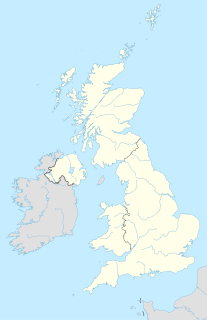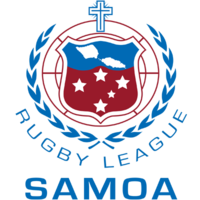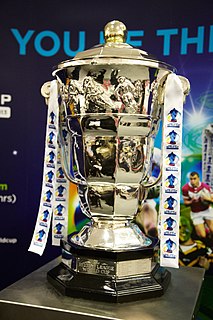
The 1995 Rugby League World Cup was held during October in the United Kingdom. It was the eleventh staging of the Rugby League World Cup and was marketed as the Halifax Centenary World Cup, reflecting the tournament's sponsorship and the fact that 1995 marked the centenary of the sport. Envisaged as a celebration of rugby league football, the size of the competition was doubled, with four additional teams invited and Great Britain split into England and Wales

The Ireland men's national rugby league team, known as the Wolfhounds, is organised by Rugby League Ireland. The representative team is dominated by players from the Super League and sometimes includes players from the Australasian National Rugby League. Ireland is also represented by an Ireland A side, which is made up of players from the domestic Irish competition.

The Rugby Football League is the governing body for professional rugby league in England. The name Rugby Football League previously also referred to the main league competition run by the organisation. This has since been supplanted by Super League, the Championship and League 1.

The France national rugby league team represent France in international rugby league matches. They are referred to as les Chanticleers or less commonly as les Tricolores. The team is run under the auspices of the Fédération Française de Rugby à XIII.

Home Nations is a collective term with one of two meanings depending on context. Politically it means the nations of the constituent countries of the United Kingdom]. In sport, if a sport is governed by a council representing the island of Ireland, such as the Irish Rugby Football Union, the term can refer to the nations of the constituent countries on the island of Great Britain and the Irish nation
The 1995 Rugby League Emerging Nations Tournament was held alongside the Centenary Rugby League World Cup. Although the competition received little build-up or promotion, the novelty value of the teams taking part encouraged relatively large crowds, and the competition was a success. A crowd of 4,147 was present at Gigg Lane, Bury for the final between the Cook Islands and Ireland.
The 2000 Rugby League Emerging Nations Tournament was held alongside the 2000 Rugby League World Cup. As with the World Cup, the competition was poorly attended in comparison to the previous event. The tournament was won by the British Amateur Rugby League Association (BARLA).

The England national rugby league team represents England in international rugby league.

The Wales national rugby league team represents Wales in international rugby league football matches. Currently the team is ranked fourteenth in the RLIF World Rankings. The team was run under the auspices of the Rugby Football League, but an independent body, Wales Rugby League, now runs the team from Cardiff. Three Welsh players have been entered into the Rugby League Hall Of Fame.

The Scotland national rugby league team represent Scotland in international rugby league football tournaments. Following the break-up of the Great Britain team in 2008, Scottish players play solely for Scotland, apart from occasional Southern Hemisphere tours, for which the Great Britain team is expected to be revived. The team is nicknamed the Bravehearts.
The Rugby League European Championship is a rugby league football tournament for European national teams that was first held in 1935.
The International Rugby League (IRL) is the global governing body for the sport of rugby league football. Previously known as the Rugby League Imperial Board, the International Rugby League Board and latterly the Rugby League International Federation, the IRL is responsible for the Laws of the Game, the development, organisation and governance of rugby leagues internationally, and for the sport's major international tournaments; most notably the Rugby League World Cup.

The Tonga national rugby league team represents Tonga in rugby league football. They are currently the fourth ranked team in the world. The team was formed to compete in the 1986 Pacific Cup, and have competed at five Rugby League World Cups, starting in 1995 and continuing consecutively until the most recent tournament in 2017, where they achieved their best ever result as semi-finalists.

The Samoa national rugby league team represents Samoa in rugby league football and has been participating in international competition since 1986. Known as Western Samoa prior to 1997, the team is administered by Rugby League Samoa and are nicknamed Toa Samoa.

The Italy national rugby league team represents Italy in rugby league football. With origins dating back to the 1950s and 1960s, the team has competed regularly in international competitions since 2008, when their current governing body, the Federazione Italiana Rugby League, was formed. They are currently ranked 13th in the RLIF World Rankings.
The South Africa national rugby league team are a rugby league football team that represents South Africa. South Africa to date have competed at two Rugby League World Cups in 1995 and 2000 but have failed to win a game in the competition.

Rugby league is played across England but is most popular in Northern England, especially Yorkshire and Lancashire where the game originated. These areas are the heartland of rugby league. The sport is also popular in Cumbria where the amateur game is particularly powerful.
The Women's Rugby League World Cup is an international rugby league tournament, contested by the women's national team of the Rugby League International Federation (RLIF). The competition has been held since 2000 in Great Britain and since 2008 has been part of the Festival of World Cups. Under the current format, eight teams are separated into two groups of four with the top two qualifying for the semis.

The Rugby League World Cup is an international rugby league tournament, contested by national teams of the Rugby League International Federation, which was first held in France in 1954, the first World Cup in either rugby code. The idea of a rugby league World Cup tournament was first mooted in the 1930s with the French proposal to hold a tournament in 1931, and again in 1951. The fifteen tournaments held to date have been at intervals ranging from two to eight years, and have featured a number of formats. So far three nations have won the competition. Australia, France and New Zealand are the only teams to have played in all tournaments. Since 2000, the RLIF has also organised World Cups for women, students and other categories. The 2017 Rugby League World Cup was held in Australia, New Zealand and Papua New Guinea which was won by Australia.
The 1934–35 Rugby Football League season was the 40th season of rugby league football. A single league Championship was contested by twenty eight teams. The Challenge Cup was contested for the 35th time and the first European Championship took place between England, France and Wales.












